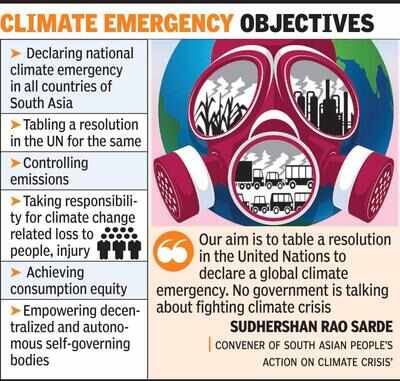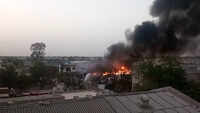
Nagpur: Members of over 50 civil society organizations from vulnerable countries are all set to launch the ‘South Asian People’s Action on Climate Crisis’— a first-of-its-kind public campaign for climate emergency. With this, they hope to battle climate change as well as the taciturn of the governments.
The stakes are high: South Asia is not just one of the world’s largest emitter of greenhouse gases but also the most vulnerable region to climate change impacts, with the World Bank declaring “almost half of South Asia vulnerable to climate hot-spots”.
The latest global climate change risk index (2019) ranks Bangladesh and Pakistan in the top nations at risk. India and Nepal are in the top 20 while Sri Lanka and Afghanistan in the top 70.
To combat the scourge, the campaign has a clear demand: Declaring climate emergency at a national level. “Our aim is to table a resolution in the United Nations to declare a global climate emergency. No government is talking about fighting climate crisis,” said Sudhershan Rao Sarde, convener of the movement.
Experts from all over the country working on climate action projects attended the campaign’s first preparatory meeting held in Nagpur on Monday. They have started charting a road map for the region and a launch meeting is expected to be held in September.
Apart from climate scientists, researchers and activists, the forum will also comprise of labour associations, farmers and other stakeholders whose livelihoods are directly affected by climate change.
Those spearheading the campaign believe that extreme heatwaves, rising sea levels, arid as well as increased precipitation and other climate catastrophes will create millions of climate refugees. “In a country like Bangladesh whose population density is about three times more than India, climate change-induced salinity will force roughly 3 crore people to migrate. With the climate refugees spilling into neighbouring countries like India, a severe conflict will be triggered,” said co-convener Soumya Dutta, who is also an advisory board member of the UN Climate Technology Centre and Network.
Of the view that mobilizing population is need of the hour, the experts are charting a blueprint on how South Asian countries can best battle climate change. “North nations emissions must become net zero by 2025 while that of South nations by 2030. Decentralized sand autonomous self-governing bodies must have oversight powers over provincial and national governments. Though climate change is a global problem, local initiatives are important, ” said Sudhir Paliwal, a member of the core working team.
CLIMATE EMERGENCY OBJECTIVES
- Declaring national climate emergency in all countries of South Asia
- Tabling a resolution in the UN for the same
- Controlling emissions
- Taking responsibility for climate change related loss to people, injury
- Achieving consumption equity
- Empowering decentralized and autonomous self-governing bodies
The stakes are high: South Asia is not just one of the world’s largest emitter of greenhouse gases but also the most vulnerable region to climate change impacts, with the World Bank declaring “almost half of South Asia vulnerable to climate hot-spots”.
The latest global climate change risk index (2019) ranks Bangladesh and Pakistan in the top nations at risk. India and Nepal are in the top 20 while Sri Lanka and Afghanistan in the top 70.
To combat the scourge, the campaign has a clear demand: Declaring climate emergency at a national level. “Our aim is to table a resolution in the United Nations to declare a global climate emergency. No government is talking about fighting climate crisis,” said Sudhershan Rao Sarde, convener of the movement.
Experts from all over the country working on climate action projects attended the campaign’s first preparatory meeting held in Nagpur on Monday. They have started charting a road map for the region and a launch meeting is expected to be held in September.
Apart from climate scientists, researchers and activists, the forum will also comprise of labour associations, farmers and other stakeholders whose livelihoods are directly affected by climate change.
Those spearheading the campaign believe that extreme heatwaves, rising sea levels, arid as well as increased precipitation and other climate catastrophes will create millions of climate refugees. “In a country like Bangladesh whose population density is about three times more than India, climate change-induced salinity will force roughly 3 crore people to migrate. With the climate refugees spilling into neighbouring countries like India, a severe conflict will be triggered,” said co-convener Soumya Dutta, who is also an advisory board member of the UN Climate Technology Centre and Network.
Of the view that mobilizing population is need of the hour, the experts are charting a blueprint on how South Asian countries can best battle climate change. “North nations emissions must become net zero by 2025 while that of South nations by 2030. Decentralized sand autonomous self-governing bodies must have oversight powers over provincial and national governments. Though climate change is a global problem, local initiatives are important, ” said Sudhir Paliwal, a member of the core working team.
CLIMATE EMERGENCY OBJECTIVES
- Declaring national climate emergency in all countries of South Asia
- Tabling a resolution in the UN for the same
- Controlling emissions
- Taking responsibility for climate change related loss to people, injury
- Achieving consumption equity
- Empowering decentralized and autonomous self-governing bodies
Elections 2019
Trending Topics
LATEST VIDEOS
More from TOI
Navbharat Times
Featured Today in Travel
Quick Links
Lok Sabha Election Schedule 2019Lok Sabha Election NewsDelhi Capitals teamMI team 2019Rajasthan Royals 2019RCB team 2019Maharashtra Lok Sabha ConstituenciesBJP Candidate ListBJP List 2019 TamilnaduShiv Sena List 2019AP BJP List 2019Mamata BanerjeeBJP List 2019 MaharashtraPriyanka GandhiBJP List 2019 KarnatakaAMMK Candidate List 2019BJP List 2019 WBLok Sabha Elections in Tamil NaduBSP List 2019 UPNews in TamilLok Sabha Poll 2019Satta Matka 2018PM ModiMahagathbandhanNagpur BJP Candidate ListChandrababu NaiduTamil Nadu ElectionsUrmila MatondkarNews in TeluguMadras High CourtTejashwi YadavArvind KejriwalTejasvi SuryaPawan KalyanArvind KejriwalYogi AdityanathJaya PradaSatta King 2019Srinagar encounter
Get the app







